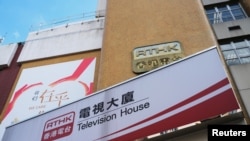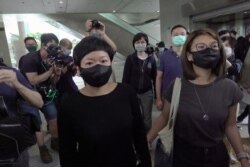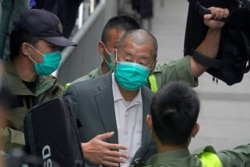A series of changes at Hong Kong's only public broadcaster is worrying media analysts who see Radio Television Hong Kong's response to pressure as a test case for the city's independent journalism.
Financed by annual government funding, Radio Television Hong Kong (RTHK) has come under increased scrutiny over its editorial independence following decisions related to content and staffing. Widespread anti-government protests in 2019, the new national security law and a change in leadership appear to have accelerated those changes.
Media analysts say that the climate for journalism overall in Hong Kong has chilled since Beijing introduced the national security law last June.
"We talk about the 'red lines' in Hong Kong, but the paint is still fresh on the red lines," said Eric Wishart, press freedom committee co-convener for Hong Kong's Foreign Correspondents' Club (FCC).
Despite a charter asserting its independence, at RTHK those red lines appear to be firmly in place.
Under the leadership of new director Patrick Li, at least 10 shows have been canceled over partiality concerns, thousands of videos older than 12 months were removed from social media, and Hong Kong's Chief Executive Carrie Lam has been given daily TV segments to host a show that promotes controversial electoral reforms proposed by Beijing.
The broadcaster has come under fire from the Hong Kong Journalists Association over its decisions, including to not renew the contract of one of its reporters, Nabela Qoser.
The broadcaster received complaints about Qoser's stinging interview with Lam during the height of the anti-government protests.
An earlier investigation into Qoser's conduct cleared the journalist. But the investigation was reopened.
"The Association of Journalists is worried that once RTHK, as a public broadcaster, sets a bad example, penalizes reporters who raise sharp questions, prevents them from renewing their contracts or even withholds their remuneration, [it] will eventually have a chilling effect and seriously affect press freedom," the association said in a statement posted to Facebook.
A second RTHK journalist, Bao Choy, was found guilty on two counts of obtaining public data illegally. The former producer used the research for an award-winning documentary "Hong Kong: Connection."
The show investigated the response from Hong Kong police following attacks from gang members against pro-democracy protesters in the city's Yuen Long district in 2019. At the time of her first court appearance, the producer told VOA that authorities are "using the law to suppress press freedom."
In April, a Hong Kong court ruled Choy failed to declare that her search for public information was for journalistic purposes. The online form shows no option to specify the purpose of a search. She was fined US$770. Choy's RTHK contract expired in January and was not renewed.
The new head of RTHK, Li, did not reply to VOA's request for comment on a series of issues about changes at the broadcaster.
A spokesperson for the broadcaster was cited in reports saying that Lam's show is in line with the charter's mandate to promote a sense of citizenship and national identity. And RTHK says its removal of videos from social media is in line with how content is handled on the main website.
Wishart, of the Hong Kong FCC, said that Choy's method would be regarded as "routine reporting around the world," but the media playing field is shifting.
"(Hong Kong) is a changing landscape, and that is a big, big challenge for everybody. For Bao Choy, two years ago would not have been an issue, now it was an issue. For the kind of programs that are being canceled in RTHK, a year ago that wouldn't have been a problem," Wishart said.
His words typify the feeling among the media in Hong Kong: That red lines for journalists are changing rapidly.
Another point-in-case is RTHK's award-winning producer Yvonne Tong. Local media reported that she quit in April after facing online scrutiny from pro-Beijing websites and Chinese-state media.
The pressure came after Tong interviewed a World Health Organization (WHO) adviser, Bruce Aylward, in March last year about the coronavirus pandemic. When Tong raised Taiwan's success in containing the virus, Aylward said he couldn't hear the question, then the call was disconnected.
Taiwan is self-governed but claimed by China.
Tong was criticized by pro-Beijing political figures over the interview. A government press release said it "breached the One China principle," in which Beijing insists that Taiwan must be considered part of China.
Keith Richburg, director of Hong Kong University's Journalism and Media Studies Center and president of the FCC, told VOA the RTHK cases are "troubling."
"Any one of these would raise eyebrows, but you take all of these things together, and the idea they give a talk show to the chief executive, which is basically a public service announcement, and that's sort of 'death by a thousand cuts,'" Richburg said.
"There is clearly a pattern here that it would indicate they want to turn RTHK into less of an independent news agency and something that more promotes and supports official government policies," Richburg said.
With the YouTube archive, an RTHK senior employee, who asked not to be identified to avoid reprisal, told VOA that internally, directors cited RTHK's content policy and limited space on the broadcaster's servers.
"If they are familiar with YouTube, they don't have this restriction," the employee said.
"These contents were made possible out of public funds, so I think it belongs to the public, so I don't see how someone has the power to remove it from their will," the senior employee said.
The restrictions and show cancellations are making some journalists rethink their future at RTHK.
A freelancer told VOA they plan to leave, saying investigative reporting is no longer possible amid questions over the broadcaster's editorial independence. The journalist asked to not be identified to protect them and their team from any retaliation.
An executive producer who headed "Hong Kong: Connection" resigned this month. RTHK reported that Paul Lee quit after being told the program would no longer cover current affairs.
"Hong Kong: Connection" won the Chinese-language documentary prize at the 2021 Human Rights Award.
Journalism professor Richburg said that anything critical of the government, national security law or electoral reforms appear to be flashpoints, adding that Hong Kong news outlets like Apple Daily "are on the front lines."
Media tycoon and Apple Daily founder Jimmy Lai is currently in jail on a host of charges, including under the national security law. Lai has been denied bail on several occasions, apparently due to interviews with international media, which prosecutors say is a form of "foreign collusion" prohibited under the national security law.
"I don't see Hong Kong becoming completely closed," Richburg said. "But I do see it becoming more difficult for journalists to operate here, because people are becoming reluctant to talk to them."









